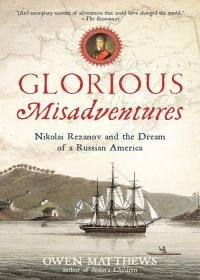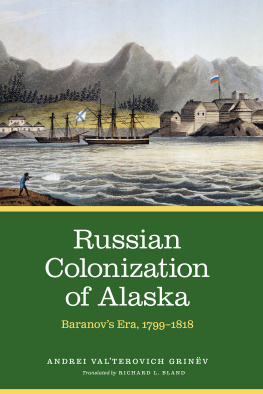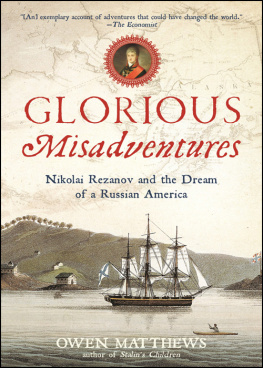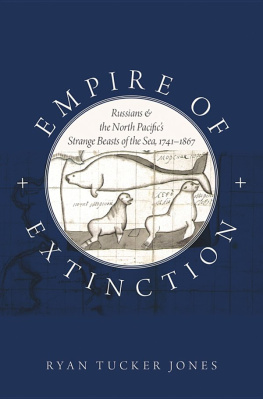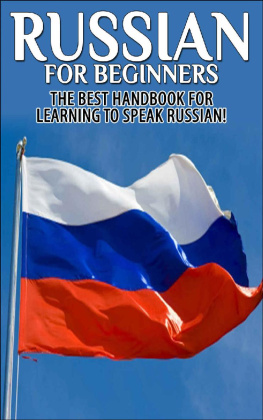This book is published with the assistance of a grant from the Samuel and Althea Stroum Endowed Book Fund.
2015 by the University of Washington Press
Printed and bound in the United States of America
Composed in Warnock, a typeface designed by Robert Slimbach
Design: Dustin Kilgore
19 18 17 16 15 5 4 3 2 1
All rights reserved. No part of this publication may be reproduced or transmitted in any form or by any means, electronic or mechanical, including photocopy, recording, or any information storage or retrieval system, without permission in writing from the publisher.
UNIVERSITY OF WASHINGTON PRESS
www.washington.edu/uwpress
LIBRARY OF CONGRESS CATALOGING-IN-PUBLICATION DATA
Owens, Kenneth N.
Empire maker : Aleksandr Baranov and Russian colonial expansion into Alaska and Northern California / Kenneth N. Owens, with Alexander Yu. Petrov.
pages cm. (Samuel and Althea Stroum books)
Includes bibliographical references and index.
ISBN 978-0-295-99459-8 (hard cover : alk. paper) 1. Baranov, Aleksandr Andreevich, 17451819. 2. RussiansAlaskaHistory. 3. RussiansCalifornia, NorthernHistory. 4. Rossiisko-amerikanskaia kompaniiaHistory. 5. AlaskaHistoryTo 1867. 6. California, NorthernHistory. I. Petrov, A. IU. II. Title.
F907.B23O94 2015
979.802092dc23
[B]
2014041601
The paper used in this publication is acid-free and meets the minimum requirements of American National Standard for Information SciencesPermanence of Paper for Printed Library Materials, ANSI Z39.481984.
PREFACE AND ACKNOWLEDGMENTS
IN AUGUST 1790 ALEKSANDR ANDREEVICH BARANOV, SON OF A merchant trader from a remote small city in northern Russia, clambered aboard a waiting ship in Okhotsk, Russias main Pacific port, and set sail for North America. A balding, rather stout person, short in stature and already well into his middle years, Baranov did not then appear to his contemporaries as a man with any extraordinary talents. Yet for the next quarter century and more, he was the leading figure in guiding the growth of Russias overseas colonies in Alaska and northern California while shaping in them a distinctive, multiethnic society that in various ways endures into the present.
Bearing the title chief manager first for an Irkutsk-based merchant fur trading company, then for the imperially chartered Russian-American Company (RAC), Baranov proved to be something of a commercial genius. He combined shrewd business sense with a kind of buccaneering bravado. Under his management, a small Russian and Native Alaskan workforce engaged in predatory hunting and trading for sea otter peltry, seals skins, and the furs of foxes and other land mammals, making immense fortunes for company directors and stockholders in Siberia and European Russia. These activities extended Russian authority from the Aleutian Islands and maritime Alaska as far south as Californias Bodega Bay. Despite hardships and setbacks of every sort, amplified by a pitiful lack of support from his homeland, Aleksandr Baranov imprinted his personality on an epic age in North American frontier history.
Baranovs career has not sufficiently engaged the attention of the history profession either in the United States or in Russia. His first biographer, Kiril Khlebnikov, met him in Sitka (New Archangel) near the close of his career, when Baranov was at last being allowed to retire. An office manager for the RAC, Khlebnikov developed intense admiration for the veteran chief manager. The book he later wrote was a slender laudatory account, lacking any critical perspective to modify the authors glowing praise for his subject. Based almost exclusively on Baranovs oral recollections, Khlebnikovs publication is remarkable as much as for what it omitted as for what it included. This work, in other words, is an exercise in biased historical storytelling, selectively describing a limited number of events in ways most favorable to Baranov and to Khlebnikovs employer, the RAC.
By default, Khlebnikovs Life of Aleksandr Andreevich Baranov has remained the main source of information about this man and his career for more than a century and a half. When, as a western frontier historian, I first became interested in the history of Russian America forty some years ago, I was disappointed to find only two other biographical accounts, both relying almost exclusively on the Khlebnikov work. And like Khlebnikovs Life, these other few volumes also proved to be silent about cultural interchanges between the Russian and Russo-Siberian newcomers and the Native peoples of Alaska and northern California. Plainly, a great deal more needed to be known about Baranov and his times.
Subsequently, a sustained burst of scholarly translations has greatly eased the problem of finding English-language source materials on Russian America. Led by the late Richard A. Pierce, an indefatigable researcher, translator, and publisher, and by the Oregon Historical Society team of Basil Dmytryshyn, E. A. P. Crownhart-Vaughan, and Thomas Vaughn, a host of scholars and skilled linguists have endowed Russian American studies with a wealth of documentary works in English. And yet in the absence of any collection of Baranov papers or any RAC archive covering his administration, an obvious gap of knowledge remained.
Shortly after retiring from academia, I began to contemplate the possibility of writing a life-and-times biography of Baranov, despite my unfamiliarity with the Russian language. This possibility became a realistic undertaking once I met Alexander Yu. Petrov, a senior research fellow in the Center for North American Studies, Institute of World History, at the Russian Academy of Sciences and a member of the history faculty in Moscows State University of the Humanities. The author of a seminal study on the founding of the Russian-American Company, Alex was then a visiting professor at Oregon State University and nearing completion of a volume about Natalia Shelikhova, a primary figure in the history of the SiberianNorth Pacific fur business. Because of our mutual interest in Baranov and his times, Alex immediately agreed to join with me in a full-scale research and writing project.


